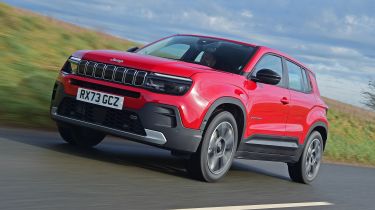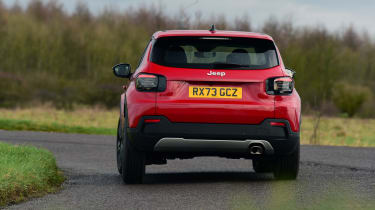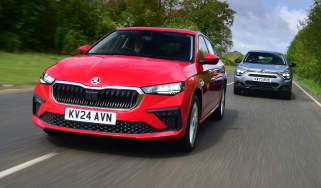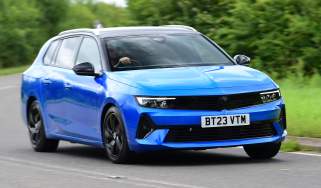New Jeep Avenger Altitude+ 2024 review: does petrol power suit Jeep’s baby SUV?
The petrol-powered Jeep Avenger retains plenty of the all-electric model’s charm, while costing significantly less
Verdict
The addition of a petrol engine has taken away none of the Jeep Avenger’s charm, but more importantly, it makes the ruggedly handsome little SUV more affordable and accessible to anyone put off by the price of the circa-£35k EV. This limited-edition Altitude+ model has the added bonus of a lengthy kit list. But no matter what fuel the Avenger is running on, it still suffers from limited rear-cabin space and an interior dominated by hard plastics.
When the chunky Jeep Avenger was unveiled, we were told that Jeep’s baby SUV would be offered exclusively as an EV in the UK. It was a bold decision that lasted for only the first few months after launch.
Towards the end of 2023, Jeep announced it would be bringing pure-petrol and mild-hybrid versions of the Avenger to our shores after all. It looks a smart move, as the desirable small SUV is now accessible to anyone not ready to go electric, and has a significantly lower starting price.
The addition of the petrol variants has brought the Jeep Avenger’s entry point down to £23,600 – more than £11,000 cheaper than the most basic all-electric version. The petrol Avenger is also within spitting distance of the newly updated Nissan Juke and Skoda Kamiq’s starting prices, and undercuts the recently facelifted Ford Puma’s by some margin.
More reviews
Car group tests
- Jeep Avenger vs Kia Niro EV vs Volkswagen ID.3: low-cost compact EVs duke it out
- Jeep Avenger vs Mazda MX-30: left-field electric SUVs face off
In-depth reviews
Long-term tests
Road tests
For our first time out in a petrol-powered Jeep Avenger, we’re driving one of the 500 limited-edition Altitude+ models coming to the UK.
Those quick enough to scoop one up are treated to a lengthy kit list that includes 18-inch rims, dual 10.25-inch displays, wireless Apple CarPlay and Android Auto connectivity, heated front seats, an eight-speaker JBL sound system, a wireless smartphone charging pad, a powered tailgate and blind-spot monitoring.
The turbocharged 1.2-litre three-cylinder PureTech petrol engine is a well-known product, since it’s already offered in related Stellantis products such as the Peugeot 2008 and Vauxhall Mokka.
The three-pot motor produces 99bhp and 205Nm of torque, along with a deep, bassy – if slightly coarse – engine note that seems to reverberate around the cabin and injects a bit more character into the driving experience, compared with the near-silent electric version.
There’s plenty of torque available for a car of this size, so the engine doesn’t need to be worked very hard when accelerating. Nor does the petrol Avenger feel slow when you put your foot down, but if you watch the speedo more closely, you’ll notice the numbers climb at a leisurely pace.
The six-speed manual gearbox is nothing special, but we like the relatively short throw between each gear. There’s also slightly more weight to the clutch compared with the manuals in the Peugeot 2008 and DS 3 (another Avenger sister car), but not enough to make crawling along in stop-start traffic a strain. We found the car’s unpredictable stop-start a bigger issue in those situations, and the comically large spherical gear lever is awkward to grab.
The Avenger’s bulging, squared-off bonnet and compact dimensions make it an easy car to place in corners, both in town and on winding B-roads, and visibility is good all round. In terms of refinement, road noise is noticeable, accompanied by wind noise around the wing mirrors at higher speeds.
The ride is on the firm side, and though it deals with potholes fairly well, it makes the car feel jittery in most environments, including on smooth motorway tarmac. Perhaps it’s down to the reduced weight compared with the electric version, but on undulating roads, occupants can feel like they’re being bounced around the cabin.
The trade-off being body roll is hard to detect when cornering. The Jeep Avenger isn’t as engaging or fun to drive as the Ford Puma, but it can handle being chucked into corners with some gusto.
Those who have fallen for the Jeep Avenger because of its looks will be pleased to hear the petrol and electric versions look virtually identical, aside from the diddy tailpipe at the rear. Up front is the latest evolution of Jeep’s iconic seven-slot grille, while the black plastic bumpers and cladding, combined with the subtly pronounced wheelarches, make the Avenger look suitably butch.
Jeep’s obsession with black plastic continues inside, as it’s easier to point out the few surfaces not made of hard, scratchy black plastic than any sort of soft-touch material. The Avenger gets away with it to an extent, because it feeds into the tough and ready-for-anything persona of the car, and build quality feels rock solid.
That said, the refreshed interior of the Skoda Kamiq, with its fabric dashboard and other sustainable materials, is more inviting and feels much higher quality, despite the similar price point.
What would lift the cabin is the kind of body-coloured dashboard panel Jeep already offers for top-of-the-range Avengers, but bizarrely only on those with yellow and black paint. We hope Jeep will start offering this as an option on other trims and colour schemes at some point.
At least the Avenger’s dual screens are reasonably sharp, and the infotainment system is intuitive and easy to navigate. Plus the climate controls are large physical toggle switches located on the centre console, just above the large storage cubby where the wireless charging pad was located in our test car.
Whether or not the Avenger will suit your needs will come down to how often you need to ferry about more than two people. The 355 litres of boot space on offer are less than in many of its key rivals, but should suffice for a lot of people, plus the load area itself is square and has a very wide opening.
However, if anyone even vaguely tall sits up front, a sliver of space is left behind for rear passengers to slot their legs into. Jeep clearly recognises this limitation, as the only creature comfort in the back is a solitary USB-C charge port.
| Model: | Jeep Avenger Altitude+ |
| Price from: | £23,600 |
| Price as tested: | £27,600 |
| Engine: | 1.2-litre 3cyl petrol turbo |
| Transmission: | Six-speed manual, front-wheel drive |
| Power/torque: | 99bhp/205Nm |
| 0-62mph: | 10.6 seconds |
| Top speed: | 114mph |
| Economy: | 50.4mpg |
| CO2: | 131g/km |
| On sale: | Now |
| L/W/H: | 4,084/1,776/1,528mm |







